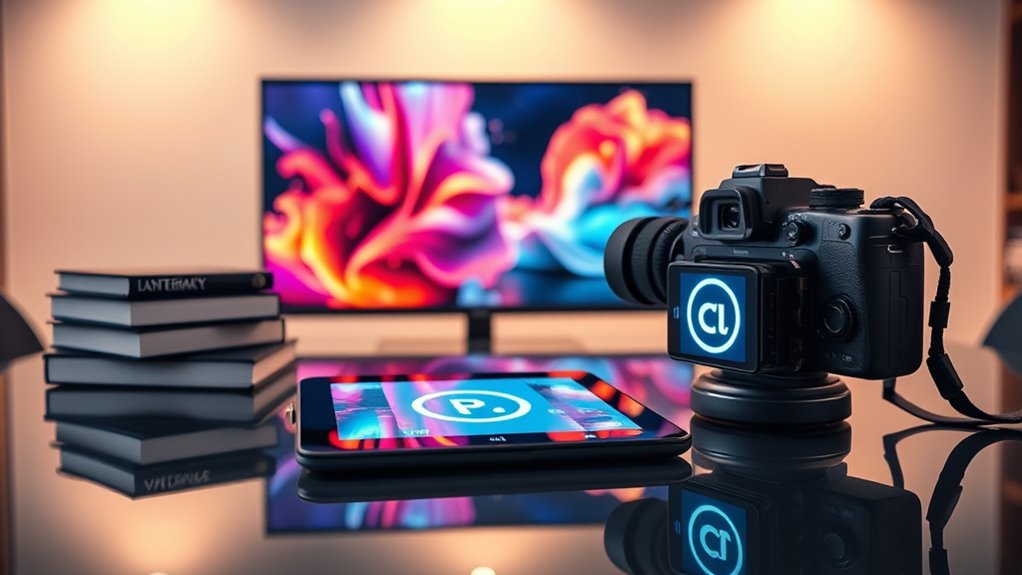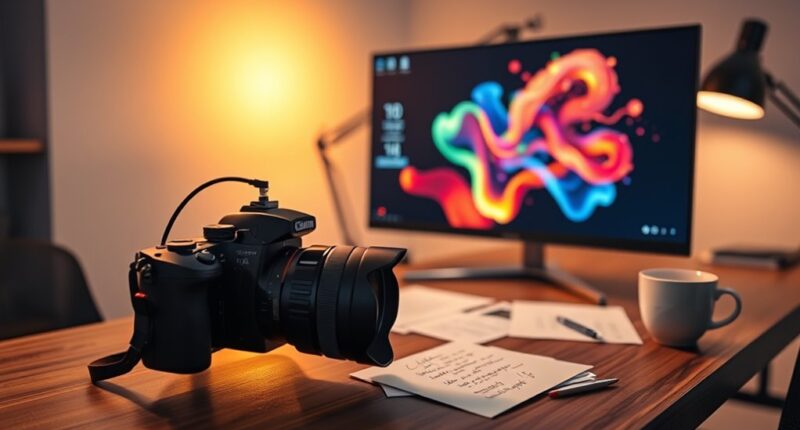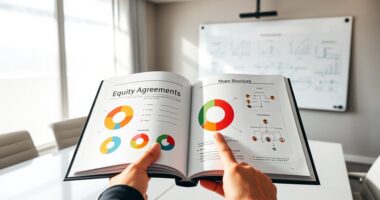When it comes to AI-generated content, ownership isn’t clear-cut. Traditional copyright laws favor human creators, but AI blurs this line because it acts autonomously. Typically, rights belong to the programmer, user, or platform, but legal systems haven’t fully adapted. Licensing can also get complicated, making it hard to protect and commercialize content. If you want to understand how these legal hurdles are evolving and what shortcuts might be possible, keep exploring this topic.
Key Takeaways
- Copyright traditionally grants rights to human creators, but AI-generated content blurs these ownership lines.
- Legal systems often do not recognize AI as an author, complicating ownership claims.
- Ownership may lie with the AI’s programmer, user, or platform, depending on context and agreements.
- Licensing challenges arise due to unclear rights, hindering commercialization and enforcement efforts.
- Developing clear legal standards for AI-generated works is essential as technology and law evolve.

Have you ever wondered who owns the rights to content created by artificial intelligence? This question is at the heart of current debates surrounding AI-generated works. When an AI produces a piece of content—be it an article, artwork, or music—the issue of authorship rights becomes complex. Traditionally, copyright law grants ownership to human creators, but with AI, the lines blur. Is the programmer who built the AI, the user who prompted it, or the AI itself the rightful owner? These questions create significant licensing challenges because legal systems worldwide haven’t fully adapted to this new reality.
In many jurisdictions, authorship rights are reserved for human creators, making it difficult to assign ownership when no human directly authored the work. If an AI autonomously generates content, the law often struggles to determine who should hold the rights—if anyone. Some argue that the person who provided the initial input or parameters should be considered the author, while others suggest that the AI itself can’t hold copyright because it lacks consciousness and intent. This uncertainty complicates licensing, as rights holders need clear legal frameworks to license or transfer rights properly. Without well-defined rules, businesses and individuals face risks around infringement, unauthorized use, or disputes over ownership.
Licensing challenges become even more evident when multiple parties are involved. For example, if you use an AI tool to create content for a commercial project, who holds the licensing rights? Is it you, the developer of the AI, or the platform hosting the AI? The answer varies depending on the terms of service and local laws, but many licensing agreements are not designed to cover AI-generated works. This leaves users in a gray area where they may unknowingly infringe on rights or find themselves unable to license the work properly. As AI tools become more sophisticated and widespread, the need for clear licensing guidelines grows. Without them, creators and companies risk legal disputes that could stifle innovation and limit the use of AI-generated content.
Furthermore, the question of authorship rights influences how content can be commercialized or protected. If ownership isn’t clearly established, it becomes challenging to enforce copyrights, license content, or monetize AI-created works. This lack of clarity discourages investment and collaboration, as parties fear legal ambiguities. To address these issues, lawmakers and industry stakeholders are beginning to explore new legal frameworks, but progress remains slow. Meanwhile, you need to navigate licensing challenges carefully, understanding that current copyright laws may not fully cover AI-generated content. Being aware of these complexities helps you manage risks and make informed decisions when dealing with AI-produced works. As the technology continues to evolve, establishing clear legal standards for AI-generated content will become increasingly crucial to protect creators and rights holders alike.
Frequently Asked Questions
Can Ai-Generated Content Infringe on Existing Copyrights?
You might wonder if AI-generated content can infringe on existing copyrights. It’s possible if the AI uses copyrighted material without permission, raising questions about AI ethics and creator liability. If you’re involved in creating or managing AI tools, you need to understand how copyright laws apply to your work. Being aware of these issues helps you avoid legal trouble and guarantees your use of AI respects original creators’ rights.
How Do International Laws Address Ai-Created Works?
You should know that international laws vary in handling AI-created works, often relying on legal jurisdiction to determine rights. Some countries treat AI as a tool, assigning ownership to the creator, while others explore new copyright rules. This legal landscape impacts the cultural impact of AI art, as different nations’ policies influence innovation and access. Staying aware of jurisdictional differences helps you navigate copyright issues effectively.
What Rights Do Creators Have Over Ai-Produced Content?
Imagine a world where your creative flair shapes AI-produced content. You might wonder about your rights—do you get proper creator recognition? The ethical implications are complex, but generally, creators hold rights if they substantially contribute or guide the process. While AI may assist, your input often determines ownership. Stay informed about evolving laws to protect your rights and guarantee your creative efforts are acknowledged and valued.
Are There Licensing Requirements for Ai-Generated Intellectual Property?
You might wonder if you need licensing for AI-generated intellectual property. Licensing challenges often arise because AI ethics emphasize transparency and accountability, making licensing complex. Generally, if you use third-party AI tools, you must adhere to their licensing terms. Stay informed about evolving regulations, as legal standards are still developing to address ownership and rights in AI creations, ensuring you’re compliant and respecting ethical guidelines.
How Is Originality Determined in Ai-Generated Works?
When determining originality in AI-generated works, you focus on machine originality and creative assessment. You evaluate whether the output stems from novel combinations or patterns, rather than mere replication. Your role involves analyzing the creative input and the AI’s process to decide if the work reflects genuine innovation. While AI assists, your judgment on the uniqueness of the result hinges on how the machine’s output demonstrates originality through its creative assessment.
Conclusion
Ultimately, understanding who owns AI-generated content is like chasing a moving target—you’ll need to stay sharp and adaptable. While the lines are blurry now, staying informed and clear on legal guidelines will help you navigate this evolving landscape. Remember, as with any battle for ownership, clarity is your best weapon. Keep questioning, keep learning, and you’ll find your way through the maze of copyright in the age of AI.









